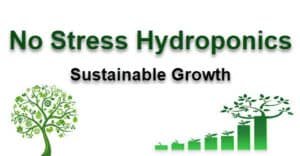
Hydroponic farming is a method of agriculture that uses mineral nutrient solutions in water instead of soil to provide nutrients for plant growth.
It can be used in both commercial and home settings, allowing you to grow vegetables, herbs, fruits and flowers with less time and effort than traditional soil-based farming methods.
Plus, hydroponic farming offers high yields as well as a range of environmental benefits. If you’re interested in getting into the exciting new world of commercial hydroponic farming but aren’t sure where to start, then this blog post is just what you need!
Here we’ll discuss how to get into the business: from picking out your space to creating an effective irrigation system – plus tips on selecting plants that will thrive in your specific environment.
What Is Commercial Hydroponic Farming And How Does It Work?
Commercial hydroponic farming is a modern method of growing plants without the use of soil. Instead, nutrient-rich solutions are used to provide nutrients directly to the roots of the plants. This type of farming requires less water and labor than traditional methods, and allows farmers to harvest crops more quickly and efficiently.
Depending on the farmer’s needs, hydroponic systems can be large or small. Larger commercial operations may employ sophisticated systems with mechanical pumps and timers that automatically feed the plants with solutions at regular intervals. Smaller setups might be as simple as a tray filled with water and plant-friendly nutrients in which the plants are placed directly into.
Commercial hydroponic farms may specialize in certain types of crops such as herbs, fruits, vegetables, flowers, or medicinal plants. The majority of these operations have their own greenhouses where they can control light levels, humidity levels and other environmental conditions with ease.
Benefits Of Commercial Hydroponic Farming Over Traditional Agriculture Methods
Commercial hydroponic farming offers many advantages over traditional agricultural practices. It is a more sustainable and efficient way to cultivate crops compared to traditional methods.
Firstly, hydroponics removes the need for soil and instead uses nutrient-rich solutions as a medium for plants to grow in. This eliminates the need for tilling, ploughing, weeding and other laborious tasks associated with traditional agriculture.
Secondly, hydroponic systems greatly reduce water usage when compared to traditional agriculture practices. Most of the water used does not evaporate due to being confined in a closed environment, meaning less water is needed to produce the same amount of crops.
Finally, commercial hydroponic farming requires less space than traditional farming methods. Crops grown with hydroponics require no farmland and can be grown in multi-storey structures, greenhouses or even indoors in a vertical or stacked arrangement.
Who Is The Typical Customer For A Commercial Hydroponic Farm Operation?
The typical customer for a commercial hydroponic farm operation is typically someone looking to produce high-quality, high-yield crops with minimal inputs. These customers are often those in the agricultural industry (such as farmers and hobbyists) or commercial businesses that are interested in producing food products or ornamental plants.
Additionally, research institutions and universities may use hydroponic farms for their own research initiatives. Finally, individuals who are interested in growing their own fruits, vegetables, herbs, or flowers at home can also benefit from using a commercial hydroponic farm setup. In general, anyone looking to grow crops without soil could potentially be a customer of a commercial hydroponic farm operation.
No matter what type of customer uses the commercial hydroponic farm operation, they all have one thing in common: they want the most efficient and cost-effective way to produce high-quality crops.
How Much Money Can You Make In The Commercial Hydroponic Farming Industry?
The actual amount of money you can make in the commercial hydroponic farming industry is largely dependent on several factors. The size of your operation and the type of crops you are growing will determine how much money you can expect to make.
Additionally, the number of hours you are willing to put into it and your expertise with hydroponic farming techniques will also play a role in profitability.
In general, many large-scale hydroponic farms have been able to generate profits ranging from $50,000-$500,000 per year depending on their size and production output. Smaller scale operations may generate less profit but still be able to turn a healthy return on investment when utilizing smart business strategies like automated systems and effective marketing techniques.
Challenges You Will Face When Starting A Commercial Hydroponic Farm Business
Here are some of the most common challenges you may encounter when starting your own commercial hydroponic farm business:
Financing
Securing capital or financing is often one of the biggest hurdles businesses face when getting started. You need to have a realistic budget and cost estimation that takes into account all of the initial expenses, including purchasing grow lights, nutrients, seedlings and other necessary equipment.
Regulatory & Legal Compliance
Every hydroponic farm business must comply with the relevant local, state and federal regulations in order to operate legally. It’s important to be aware of the laws and regulations that apply specifically to hydroponic farming operations in your area, so you can plan accordingly before launching your business.
Property Availability & Zoning Permits
Once you have secured financing for your venture, you need to find a suitable location for your farm that meets zoning requirements and has access to utilities such as water, electricity and gas.
Sourcing
One of the keys to success in any business is finding reliable suppliers and vendors for your materials and inputs, such as seeds, growing media, nutrients, etc.
Pest Control & Disease Management
Pests and disease are among the biggest threats to successful hydroponic farming operations. You need to have an effective pest control strategy in place that will help protect your crops from infestation while also preserving the overall health of your plants.
Conclusion
It is not impossible to get into commercial hydroponic farming. However, it takes a lot of research, skill, and money. Mistakes can be costly, so make sure you know what you’re doing before taking the plunge into commercial hydroponic farming.
Do your homework and talk to other farmers to get an idea of what’s involved. With proper planning and execution, you could be successful in this rewarding industry.
